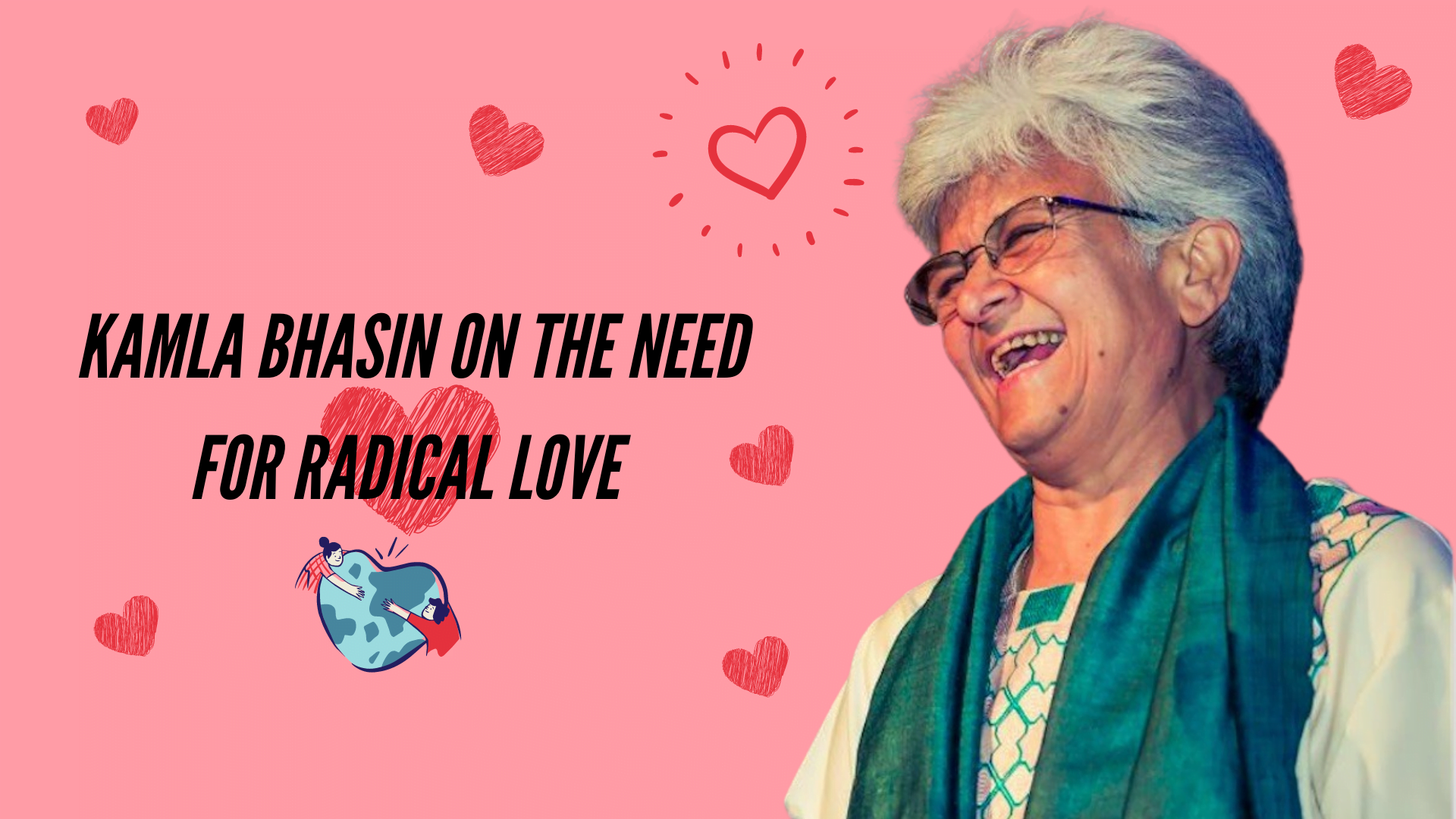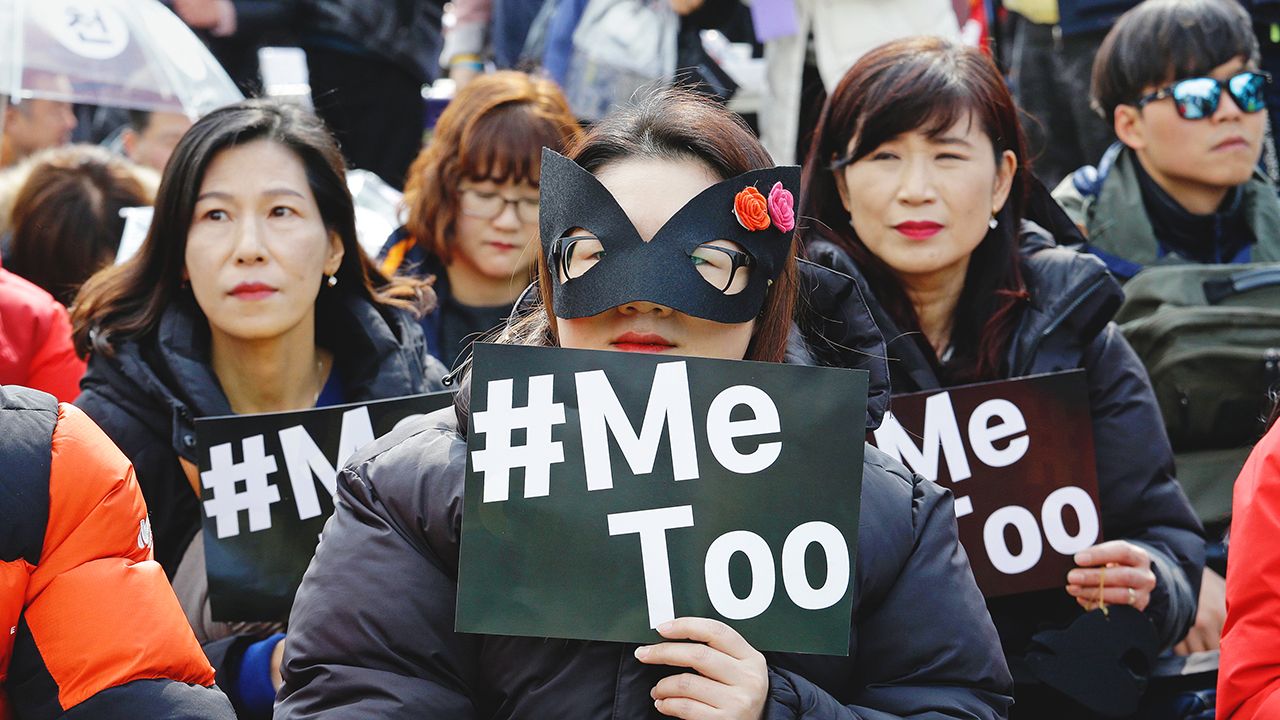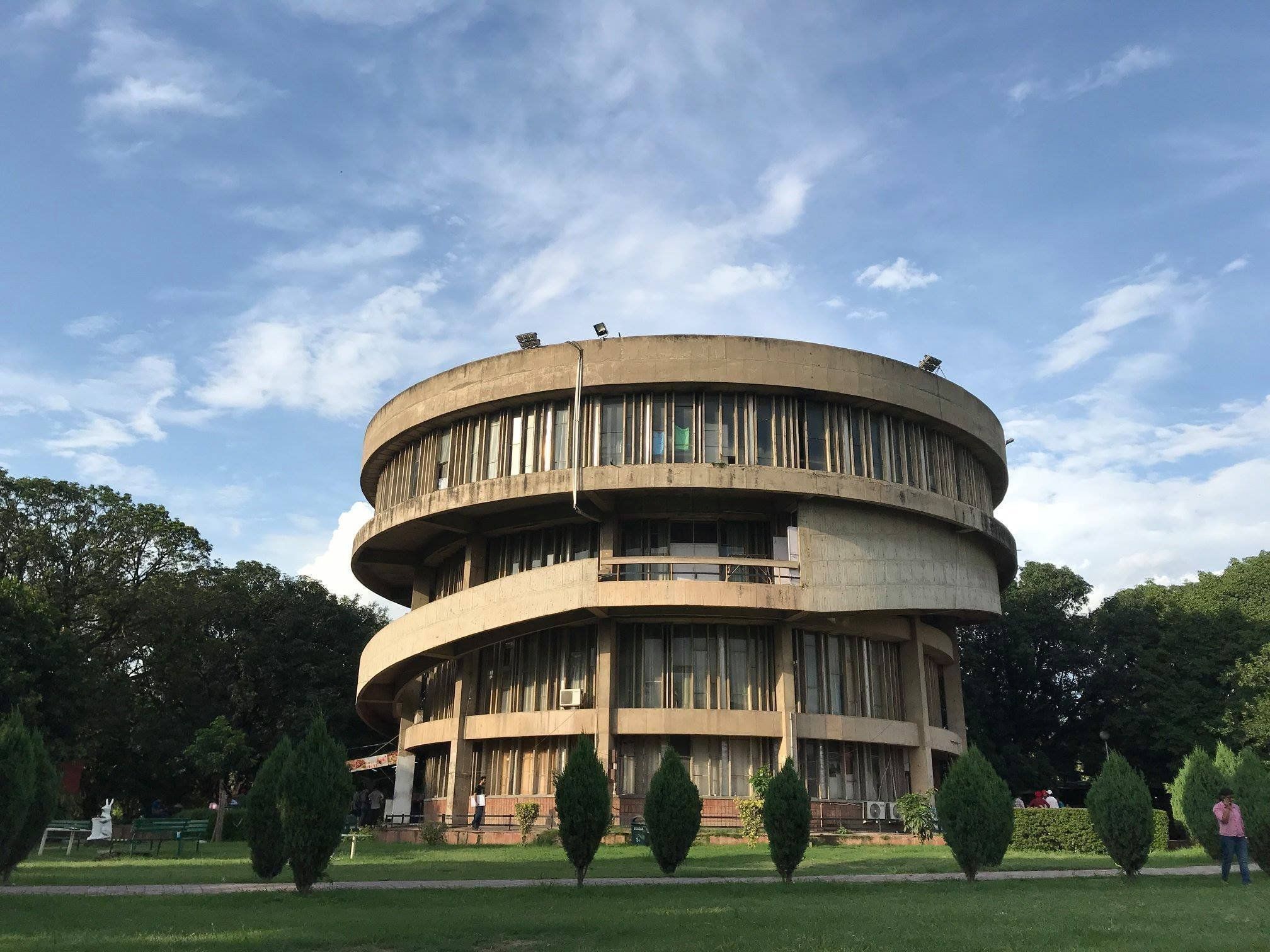Posted by Kamla Bhasin
Mohabbat Zindabad!
It was the mid 80s and I was in a gathering of civil society groups in Dhaka, being conducted by Anis bhai, a thinker and activist, who worked with ILO at that time. Out of the blue, he asked me, “Kamla, what motivates you to do your work??” Without thinking much, I blurted out, “Love, Anis bhai, I think love is what inspires me and pushes me to do my work.”
The more I thought about my spontaneous answer, the more I found myself agreeing with it. Once the word love was spoken, that thought articulated, I became conscious about it and started identifying and learning about work based on love. It was around that time that I heard what Che Guevara, whose T-shirts so many young people wear all over the world, had said about his revolution and love, “The true revolutionary is guided by a great feeling of Love. It is impossible to think of a genuine revolutionary lacking this quality.”
Much later I read bell books, who said, “The practice of love is the most powerful antidote to the politics of domination”.
Since then, I have tried to incorporate love in our work at Sangat. Now I feel, it has become essential to talk about love because we are being engulfed by hate, othering and violence of all kinds, including violence against mother nature.
I have tried to incorporate love in our work at Sangat. Now I feel, it has become essential to talk about love because we are being engulfed by hate, othering and violence of all kinds, including violence against mother nature.
Also read: In Conversation With Kamla Bhasin: Renowned Developmental Feminist Activist
Therefore, I am delighted that FINALLY we are daring to speak of love in our seminars. For some strange reason, this has been a taboo subject. Even feminist activists, human rights defenders, progressive activists of any kind, would not talk of love as a VALUE, strategy or way of being in the context of our work. I wonder why? Is this because we are afraid to be called romantic, sentimental or naive?
Or is it because we think there is no place for love in the serious business of social justice, equality, human rights? Is it any less naive or sentimental or romantic to talk of equality and rights in today’s neo-liberal, capitalist, destructive world?
If we the civil society does not talk about, practice and spread love, who will do it? If we do not practice love, how do we expect our governments, police, judiciary, and business people to do it?
None of us seem to have a problem talking about emotions and love in our personal and domestic lives but, we do not talk about love in our public work and life. Why should something as life affirming as love be locked in or be limited to the personal domain?
If love is good for our personal relationships and wellbeing, it could be good for our public domain too. We see that given how the public domain is guided by competition and power hierarchies, we now train the young and upcoming generations, specially our boys, to be competitive, dominating and power-demanding, in order to succeed in their jobs and public dealings.
As we feminists have been saying since time immemorial, the domestic and the public are not separate. What happens inside affects our outside and vice versa.
Sangat and I talk of love not because we have any expertise or we have perfected the art of loving. We talk about it to break our silence on love, to break the binary between love and political work and to proclaim, “Yes, we believe in love and its place in our feminist, human rights and justice work; we believe love is life-affirming; we believe hate cannot remove hate from our lives, only love can. We believe without the practice of love, our work, organisations, campaigns, struggles will fight the same problems in the future that we are fighting now: hierarchies, inequalities, power games.
There is and will be deeye tale andhera, that is, darkness under the lamp.
Nothing I am going to say is new or original. Most of what I will say is based on the wisdom, studies and actions of people I respect and try to follow, people like the Buddha, Prophet Mohammad PBUH, Kabir, Guru Nanak, Savitri Bai and Jyotiba Phule, Gandhiji, Baba Sahib Ambedkar, Nelson Mandela, Martin Luther King Jr., Erich Fromm, bell hooks, Thich Nhat Hanh and many more.
Friends, is it not amazing that even in this world which is torn apart by hatred, violence, injustice, hierarchies, we are making an attempt to proclaim love? I say this because, I believe the basis of Article 1 of the Universal Declaration of Human Rights, the basis of the Directive Principles of the Indian Constitution is love.
Is it not?
Our societies may not practice love but they make masjids and mandirs and statues mainly, if not only, to honour and remember people who preached love, mercy and compassion, such as people like Krishna, the Buddha, Jesus, Prophet, Guru Nanak, Nizamuddin Aulia and others like them.
Meanwhile, there are almost no temples for Hitler, Mussolini and other dictators. If emperor Ashok is still remembered, it is because he was a disciple of the Buddha.
I think it is good to remember this as we embark on the path of love with hope and determination.
Not the Love of Power, But the Power of Love
I believe that all hierarchies, conflicts and violence in the world are because of love of power. We love our power and destroy nature, men love their power and dominate women, the dominant castes, races, and corporates love their power and push others down. Love of power rules and destroys the world. This, I believe, can be countered only by the power of love.
Radical Love
Love has many meanings, however, here we are specifically talking about love in the context of social justice, equality and rights. The love we are talking about here could be called universal love, not just for human beings. This love does not distinguish between us and them. Those who practice radical love such as this, look at the rich and the poor, powerful and marginalised with the same eyes and respect and acceptance.
We could call it radical love, because radical involves growing from the root, foundational and leading to big changes, transformations, not just tinkering with things.
The other words for a similar kind of love, I believe, are inclusion, harmony, forgiveness, equity, democracy and justice. The other aspects that this love covers are acceptance, care, a lack of judgment and the willingness to both give and receive.
Love itself is a radical act and a powerful emotion. It extends, deepens and enlarges us. It breaks the boundaries that societies and we create around ourselves. This love liberates us from selfishness and self-obsession.
Radical love is unconditional. It is not utilitarian where we say if you do this, then I will love you. I believe radical love is what forms the basis of the concept VASUDHAIV KUTUMBAKAM, the world is one family. The African Ubuntu is based in radical love: “I am because we are.” When Guru Nanak says, “I see no enemy. I see no other”, I believe he too, is coming from a place of radical love.
I think Kabir is talking of radical love when he says,
“Pothee padh padh jag mua, huaa na Pandit koy
Dhaaee aakhar Prem ka padhey so Pandit hoy“
“The ones who read thick books are no Pundits. Those who know the two and a half letters of Love are Pundits.”
I believe it is the radical love in Bulleh Shah’s heart that made him write thus,
Mandir dhaa de, Masjid dhaa de, dhaa de jo kujj dhaana
Par kise da Dil naa dhaaeen, Rabb Dilaan wich rehnda.
Break the temple, break the Masjid, break whatever you wish, but never break anyone’s heart because that is where God resides.
Radical love is that love of god, for which the poet Nida Fazli says,
Ghar se Masjid hai bahut door chalo yoon kar lein
Kisi rotey huye bachche ko hansaaya jaaye
“The Masjid is far from the house, so let’s make a crying child laugh.”
Life is not possible without love. Would any woman give birth to a child, breastfeed for months, nurture for years, without love?
The first step towards radical love is loving one self. If I do not love, respect, honour myself, I cannot love anyone else. I and the others are the same.
Radical love is non-dualistic, non-binary. It is based on the notion of interdependence, interconnectedness and coexistence.
Radical love is secular and spiritual. It can be inspired by a faith or religion but it is not limited to one faith. By spiritual I mean, connecting with the inside and connecting with the Universe, with all sentient beings; going beyond a purely materialist understanding of things; aspiring to be in touch with something larger than oneself, having a larger goal following human values.
I believe most people today are aching and pining to get love, to be understood and affirmed. I believe there is so much violence around us, in our families, places of work and in society because people are without love. Loveless and unhappy people participate in violence.
At Sangat we often use this slogan, “Men of quality are not afraid of equality.” This means, men who feel inferior, inadequate, who have terribly fragile egos, do violence on those weaker than them. Many violent men may themselves have been violated, so they inflict violence to others and the cycle goes on and on. People who love power, control, and domination, inflict violence. I think confident, satisfied, happy men do not do violence to others.
If you want examples of people who do violence, think of all the fascists and dictators, be they heads of states, Khap Panchayats, mafia gangs, corporate houses, Hollywood, Bollywood producers etc. , or be they heads of any political parties, heads of trade unions, NGOs or be they heads of families, fathers, older brothers, mothers-in-law or even some so called feminist leaders. To me they appear to have loveless hearts and faces because they are in to power games. They are driven by their egos.
Radical love recognises the violence outside in patriarchal, caste, class, race, religious, hetero normative structures and ideologies and it recognises the violence inside each one of us. This is why I call it radical. This connection between the outside and the inside is an essential part of radical love.
It is very difficult to practice this. This disconnect between the inside and outside plagues most progressive activists. Most of us are busy trying to change social, economic, political structures outside, without ever looking inside ourselves, our families, and organisations. On the other hand, there are spiritual people who are busy changing the inside, without challenging the inequality outside, all around them.
The social transformers and the spiritual transformers and their world and work remain separate, they are like parallel lines, never meeting each other. This binary must go.
Practice of radical love demands that love and all the values related to love be present inside us and outside, that is in all institutions that form the civil society, such as the state, government, courts, police stations, offices, schools and colleges and in our homes.
Radical love is intersectional. It challenges all unjust exploitative ideologies and structures. I believe learning to love, nurture, care for others, seek and give support is natural. We don’t have to be taught how to love. Hating, on the other hand, is taught systematically by many so called religious, cultural, educational and political organisations.
Children born in natural, equal, just families would automatically lean to love radically, but where are such families? Especially, in a world dominated by patriarchy, class, caste, race, heteronormativity related hierarchy and power systems, there are none.
Our families teach us very little universal love. They teach us love for a few people. They teach us othering: us and them. They teach patriarchy, caste, class, race etc. Families are the biggest sites and schools of ‘othering’, inequality, injustice and violence. They teach us conditional love. If we do what our parents want us to do, they love us, otherwise not. Our children are born human, they can embrace and be embraced by the entire world, but their own families deprive them of that vastness and oneness, to begin with.
Since all of us are trained in our families, without changing our families, we cannot change any other institution and cannot make institutions democratic, just and equal. To add to the discourse of personal is political, “Tu khud ko badal, tu khud ko badal, tab hee to zamaana badlega.“ (You try to change yourself first, that is when the society will change too.)
Schools too, are like factories teaching our children competition and producing competitive, ruthless, loveless humans. Just as our jobs, which too alienate us, and make us practice cut throat competition for profit. They may fill our stomachs but mostly they destroy our souls.
I haven’t even began with religious organisations. Most of them have been commercialised and politicised. They instil in us the notions of othering. During Covid-19, most religious places were advised to and were among the first public institutions, to close their doors.
There were millions of migrant labourers walking back to their far-off villages, jobless, homeless, hungry. Yet, no religious leaders questioned the government and nor did they take evident initiatives to help these labourers.
Friends, radical love is a journey. Nobody is a perfect lover. We improve as we practice. Parvathy Baul, singer and the organiser of Tantidhatri, says, we have to keep cleaning the mirror of our heart. Bauls and Sufis do it by singing, others do it by chanting mantras. Yet others, like the Sikhs, do it by serving people.
Because love is a journey, every sinner has a future and every saint has or may have a past. Radical love is a spiritual journey. From this tiny, insignificant me to all sentient beings and to the universal energy.
According to Erich Fromm, the art of loving requires practice, concentration, dedication and lifelong commitment.
bell hooks says Love is the practice of freedom. “It begins with awareness, it grows with education for critical consciousness. The moment we choose to love, we begin to move towards freedom, to act in ways that liberate ourselves and others.”
Radical love helps us move from resistance to transformation inside and outside.
If we proclaim love as a value of our social and political work, then our motivation will be clear to us as well as the others. We will not be after power, money and control and our motivation will be focused on improving society, politics, economics etc.
Some believe that radical changes require machismo, masculinity, militarisation, violent resistance etc. All these violent ways can change societies, may be change them fast, but they do not transform. They replace one system of domination with another system of domination, one darkness with another darkness.
And there are ample examples of the same in human history. This is why Gandhi, King, Mandela emphasise on securing moral ends through moral means. Only then can we move “from falsehood to truth, darkness to light and death to immortality”.
Radical love does not mean becoming a doormat for the oppressors. It does not mean unconditional consent, or unconditional access or solidarity without criticism. It is not a free pass. It is not staying silent and sitting idly, nor is it staying still when action is required
Radical love is the basis of restorative justice. Whenever I think of restorative justice and non-violence, I think of Angulimala and the Buddha. Apparently Angulimala, out to take revenge of all the crimes done to his community, became a serial killer who would wear the little fingers of his victims in a garland around his neck.
He was angry and violent. He had already killed 99 people and was looking for his 100th victim when he met the Buddha in the forest. Angulimala was surprised that the Buddha was not afraid of death and he was willing to look at a murderer with love and compassion and listen to his story with an open heart.
This encounter transformed Angulimala and he joined the Sangha. It is said that Angulimala was most sincere in his practice and he attained Nirvana.
I believe the choice is not between violence and non-violence. Rather, it is between non-violence and non-existence. Psychiatrists have said those who hate are also harmed, they also suffer. So, either we love or we all perish.

I feel feminists and feminist movements should be all about love. Our organisations should practice love along with professionalism. We should practice love in all our relationships. Our families should be experiments in love. Feminist organisations should be places where love is practiced and sown.
I feel feminists and feminist movements should be all about love. Our organisations should practice love along with professionalism. We should practice love in all our relationships. Our families should be experiments in love. Feminist organisations should be places where love is practiced and sown.
For me there is no feminism, social justice and human rights work, without love.
How Sangat Practices Radical Love At Work
At Sangat, have tried to weave in love into our courses. The participants are from different countries, regions, religions, ethnicities, speaking different languages. Unity in diversity and acceptance of differences are ongoing message and they become a lived experience in these courses. We keep repeating that we are all born human. It is only after our birth that society puts us into different boxes and divides us.
The venues of our courses are ecological, showing our concern and love for nature. The entire campus and the meeting hall are decorated with colourful banners with messages of love and solidarity. The golden yellow and orange Sangat bags given to each participant carry the message, “Not Love of Power, Power of Love”. Many of the feminist songs we sing and teach are about love and so are some slogans.
In the inaugural session, each participant is welcomed by a hug, one by one. That creates the atmosphere for the days to come. It is also announced that creating friendships and love are the main objectives of the courses.
In all our courses, we have our sessions sitting on the ground. There are no chairs and tables made out of cut trees and no defined territories of each participant. While sitting on the floor, during breaks, one can see participants lying down with their heads in someone’s lap, or leaning against someone while sitting.
We have sessions on Sufi poetry and love. Many of the films we show in the evenings are on the theme of love and friendship.
The methodology is participatory and experiential. Personal, professional and political are all integrated in to each other. We feel our courses are like nurseries of love, friendship and solidarity and lifelong friendships are created here.
Similarly, One Billion Rising, the global campaign Sangat organises in South Asia against violence against women and girls, culminates on Feburary 14, which is celebrated as Saint Valentine’s Day. In this campaign, our main message is that violence can be challenged and removed only by love. For us the opposite of violence is not non-violence, it is love.
Also read: Kamla Bhasin: On Feminism in Pakistan and India
Many Inspiring Initiatives Towards Love
It inspires me to see that many feminist activists and human rights activists around me have been using Sufi, Baul and Kabir poetry, especially since many cultural, religious and political organisations have become divisive and are spreading hate and violence.
The Khudai Khidmatgars movement founded in 1929 by Ghaffar Khan aimed to spread the message of love and communal harmony all over the country.
Well-known social activist and thinker Harsh Mander founded Kaarwaan e Mohabbat. Sonam Kalra’s Sufi Gospel Project and Shabnam Virmani’s The Kabir Project are both about love, communal harmony and justice.
Parvathy Baul’s music and life are to promote love, equality and justice. Svati Chakravarti Bhatkal, who was the main researcher for Satya Mev Jayate, has directed a film which is produced by Kiran Rao and Aamir Khan, called “Rubaru Roshni: A Tale of Emotion, Loss and Forgiveness”. It is a story of three murders, what happens to the families of the murderers and of those who were murdered.
In all three cases the families of those who were murdered forgave the killers, after meeting and knowing them.
Valarie Kaur, a young lawyer, human rights activist in USA has started “Revolutionary Love Project” to challenge violence in US society. She aims to fight the ideology, structures and systems which breed violence and not people who are victims of that ideology and system. She has been recruiting volunteers, creating communities of love, creating curricula, books and organising trainings about love.
I conclude with three quotations.
Baba Saheb Ambedkar said the main principles of Buddhism are love, compassion and scientific attitude. According to Thoughts and Philosophy of B.R Ambedkar by C.D.Naik, “In Buddhism, intellect without feeling, knowledge without love and reason without compassion lead to pure negation, to rigidity, to spiritual death, to mere vacuity; while feeling without reason , love without knowledge (blind love), compassion without understanding lead to confusion and dissolution. Where both are united, where the great synthesis of heart and head, feeling and intellect, highest love and deepest knowledge have taken place, completeness is re-established and enlightenment is attained.“
Martin Luther King said, “I have decided to go with love, because I believe deeply that if we are seeking the highest good, then we find it through love.”
Gandhi said, “When I despair, I remember that all through history the ways of truth and love have always won. There have been tyrants and murderers, and for a time they can seem invincible but in the end they always fall. Think of it…“
Mohabbat zindabad! Long live love!




